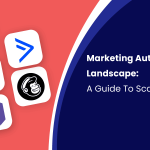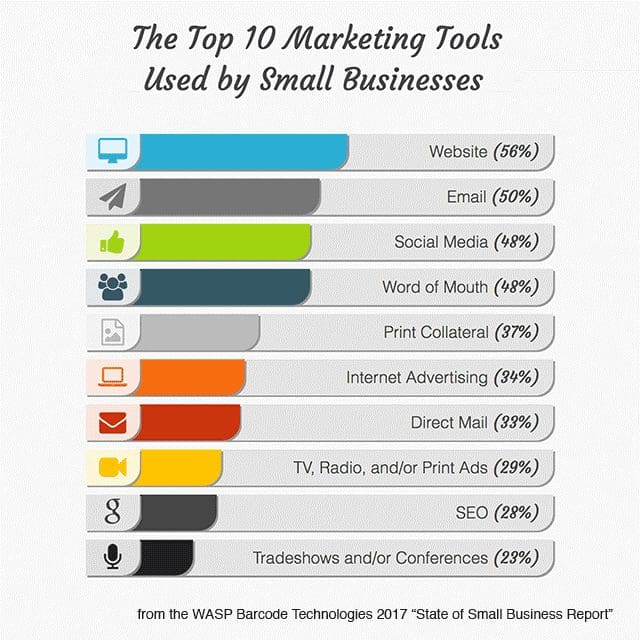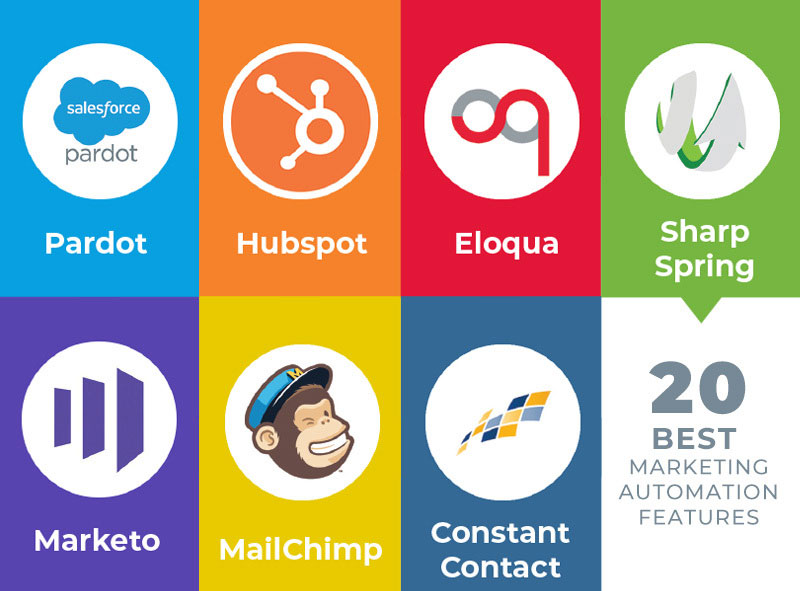-
Best Marketing Automation Software or Tools for a Small Business
- 1. What is Marketing Automation and Why is it Important for Small Businesses?
- 2. Key Features to Look for in Marketing Automation Tools
- 3. Top Marketing Automation Tools for Small Businesses
- 4. How to Choose the Right Marketing Automation Tool for Your Business
- 5. Benefits of Using Marketing Automation for Small Businesses
- What is the most successful marketing tool for small business?
-
Can marketing automation work for a small business?
- What is Marketing Automation and How Can It Benefit Small Businesses?
- Is Marketing Automation Affordable for Small Businesses?
- How Can Small Businesses Implement Marketing Automation Effectively?
- What Are the Challenges of Marketing Automation for Small Businesses?
- What Are the Best Marketing Automation Tools for Small Businesses?
-
What is the best marketing software?
- What is the Best Marketing Software for Email Campaigns?
- What is the Best Marketing Software for Social Media Management?
- What is the Best Marketing Software for SEO Optimization?
- What is the Best Marketing Software for Content Creation?
- What is the Best Marketing Software for Analytics and Reporting?
-
How much does marketing automation software cost?
- Factors Influencing the Cost of Marketing Automation Software
- Pricing Models for Marketing Automation Software
- Average Cost Range for Marketing Automation Software
- Hidden Costs to Consider When Choosing Marketing Automation Software
- How to Choose the Right Marketing Automation Software Within Your Budget
- Frequently Asked Questions from Our Community
In today’s competitive business landscape, small businesses must leverage technology to streamline operations and maximize efficiency. Marketing automation tools have become essential for managing campaigns, nurturing leads, and driving growth without overwhelming limited resources. With a wide range of options available, choosing the right software can be challenging. This article explores the best marketing automation tools tailored for small businesses, focusing on affordability, ease of use, and scalability. Whether you’re looking to automate email campaigns, track customer interactions, or analyze performance, these solutions can help you save time, enhance customer engagement, and achieve measurable results. Discover the top tools to elevate your marketing strategy.
Best Marketing Automation Software or Tools for a Small Business
Marketing automation tools are essential for small businesses looking to streamline their marketing efforts, save time, and improve customer engagement. These tools help automate repetitive tasks, such as email campaigns, social media posting, and lead tracking, allowing businesses to focus on growth and strategy. Below, we explore the best marketing automation software and tools tailored for small businesses.
See Also Email Marketing Platform Recommendation That Is Similar to Mailchimp?
Email Marketing Platform Recommendation That Is Similar to Mailchimp?1. What is Marketing Automation and Why is it Important for Small Businesses?
Marketing automation refers to the use of software to automate marketing tasks and workflows. For small businesses, it is crucial because it helps reduce manual effort, increase efficiency, and improve customer targeting. By automating repetitive tasks, businesses can focus on strategic activities like building relationships and creating content. Additionally, marketing automation provides valuable insights into customer behavior, enabling businesses to make data-driven decisions.
2. Key Features to Look for in Marketing Automation Tools
When choosing a marketing automation tool, small businesses should prioritize the following features:
- Email Marketing Automation: Automates email campaigns based on customer behavior.
- Lead Scoring and Tracking: Helps identify and prioritize high-quality leads.
- CRM Integration: Ensures seamless communication between marketing and sales teams.
- Analytics and Reporting: Provides insights into campaign performance.
- Social Media Management: Automates posting and engagement on social platforms.
 Any Good Book to Read for Learning Social Media Marketing?
Any Good Book to Read for Learning Social Media Marketing?3. Top Marketing Automation Tools for Small Businesses
Here are some of the best marketing automation tools for small businesses:
| Tool | Key Features | Pricing |
|---|---|---|
| HubSpot | Email marketing, CRM integration, analytics | Free plan available; paid plans start at $45/month |
| Mailchimp | Email automation, landing pages, audience segmentation | Free plan available; paid plans start at $13/month |
| ActiveCampaign | Advanced automation, CRM, lead scoring | Starts at $29/month |
| Zoho Campaigns | Email marketing, workflow automation, analytics | Starts at $3/month |
| Sendinblue | Email and SMS marketing, automation workflows | Free plan available; paid plans start at $25/month |
4. How to Choose the Right Marketing Automation Tool for Your Business
Selecting the right tool depends on your business needs and budget. Consider the following factors:
- Ease of Use: Ensure the tool is user-friendly and requires minimal training.
- Scalability: Choose a tool that can grow with your business.
- Integration: Look for tools that integrate with your existing software, such as CRM or e-commerce platforms.
- Customer Support: Opt for tools with reliable customer support to assist with any issues.
- Cost: Evaluate the pricing structure to ensure it fits within your budget.
 Does Anyone Else Ever Feel Lost With the Sheer Number of Marketing Automation Tools Out There?
Does Anyone Else Ever Feel Lost With the Sheer Number of Marketing Automation Tools Out There?5. Benefits of Using Marketing Automation for Small Businesses
Marketing automation offers numerous benefits for small businesses, including:
- Time Savings: Automating repetitive tasks frees up time for other business activities.
- Improved Lead Management: Helps track and nurture leads more effectively.
- Enhanced Customer Experience: Delivers personalized content and timely communication.
- Better ROI: Increases the efficiency of marketing campaigns, leading to higher returns.
- Data-Driven Insights: Provides actionable data to optimize marketing strategies.
By leveraging the right marketing automation tools, small businesses can compete more effectively in today’s digital landscape.
What is the most successful marketing tool for small business?

The most successful marketing tool for small businesses is social media marketing. It offers a cost-effective way to reach a large audience, build brand awareness, and engage directly with customers. Platforms like Facebook, Instagram, and LinkedIn allow businesses to target specific demographics, track performance metrics, and adjust strategies in real-time. Additionally, social media fosters community building and customer loyalty, making it an essential tool for small businesses.
Social media marketing is effective for small businesses because it provides a low-cost, high-reach platform to connect with potential customers. Here’s why:
- Cost-Effective: Most social media platforms are free to use, and paid advertising options are often affordable.
- Targeted Advertising: Businesses can target specific audiences based on demographics, interests, and behaviors.
- Engagement Opportunities: Direct interaction with customers builds trust and loyalty.
Choosing the right platform depends on your target audience and business goals. Consider the following:
- Identify Your Audience: Determine where your potential customers spend their time online.
- Match Platform Strengths: Use Instagram for visual content, LinkedIn for B2B, and Facebook for broad reach.
- Analyze Competitors: Study where competitors are successful and adapt your strategy accordingly.
To succeed in social media marketing, small businesses should focus on these strategies:
- Consistent Posting: Maintain a regular posting schedule to stay visible.
- Engaging Content: Share content that resonates with your audience, such as videos, infographics, and polls.
- Monitor Analytics: Use platform insights to track performance and refine your approach.
Social media advertising offers several benefits for small businesses:
- Increased Visibility: Ads can reach a larger audience than organic posts.
- Customizable Budgets: Set your own budget and adjust it as needed.
- Real-Time Results: Track ad performance and make immediate adjustments.
Avoid these common pitfalls to maximize your social media marketing efforts:
- Inconsistent Branding: Ensure your brand voice and visuals are consistent across platforms.
- Ignoring Engagement: Respond to comments and messages to build relationships.
- Over-Promoting: Balance promotional content with valuable, non-sales posts.
Can marketing automation work for a small business?

What is Marketing Automation and How Can It Benefit Small Businesses?
Marketing automation refers to the use of software and tools to automate repetitive marketing tasks such as email campaigns, social media posting, and customer segmentation. For small businesses, it can be a game-changer by saving time, reducing manual effort, and improving efficiency. Here are some key benefits:
- Time-saving: Automating tasks like email marketing or social media scheduling frees up time for small business owners to focus on core operations.
- Improved lead nurturing: Automation tools can track customer behavior and send personalized messages, helping to convert leads into customers.
- Cost-effective: By streamlining processes, small businesses can reduce labor costs and allocate resources more effectively.
Is Marketing Automation Affordable for Small Businesses?
Many small businesses assume that marketing automation is expensive, but there are affordable options tailored to their needs. Here’s why it can be cost-effective:
- Scalable solutions: Many platforms offer tiered pricing, allowing businesses to start small and scale as they grow.
- Free or low-cost tools: Tools like Mailchimp or HubSpot offer free plans with basic automation features.
- ROI-driven: The time and resources saved often outweigh the initial investment, making it a worthwhile expense.
How Can Small Businesses Implement Marketing Automation Effectively?
Implementing marketing automation requires careful planning and execution. Here’s how small businesses can do it effectively:
- Define goals: Identify what you want to achieve, such as increasing email open rates or generating more leads.
- Choose the right tools: Select platforms that align with your business size and needs, such as ActiveCampaign or ConvertKit.
- Segment your audience: Use automation to send targeted messages based on customer behavior and preferences.
What Are the Challenges of Marketing Automation for Small Businesses?
While marketing automation offers many benefits, small businesses may face some challenges:
- Learning curve: Understanding how to use automation tools effectively can take time and training.
- Content creation: Automation requires a steady stream of high-quality content, which can be resource-intensive.
- Over-automation: Relying too much on automation can make interactions feel impersonal, potentially alienating customers.
What Are the Best Marketing Automation Tools for Small Businesses?
Choosing the right tool is crucial for success. Here are some of the best options for small businesses:
- Mailchimp: Ideal for email marketing and basic automation, with a user-friendly interface.
- HubSpot: Offers a comprehensive suite of tools, including CRM and marketing automation, with a free tier for small businesses.
- ActiveCampaign: Known for its advanced automation features and affordable pricing.
What is the best marketing software?

What is the Best Marketing Software for Email Campaigns?
When it comes to email marketing, HubSpot and Mailchimp are among the top choices. These platforms offer:
- Automation tools to streamline email campaigns.
- Analytics dashboards to track open rates, click-through rates, and conversions.
- Customizable templates for creating visually appealing emails.
For managing social media platforms, Hootsuite and Buffer are highly recommended. These tools provide:
- Scheduling features to plan posts in advance.
- Performance tracking to measure engagement and reach.
- Team collaboration tools for seamless workflow.
What is the Best Marketing Software for SEO Optimization?
For SEO-focused marketing, SEMrush and Ahrefs stand out. These platforms offer:
- Keyword research tools to identify high-ranking terms.
- Backlink analysis to monitor website authority.
- Competitor tracking to stay ahead in search rankings.
What is the Best Marketing Software for Content Creation?
For content creation, Canva and Adobe Creative Cloud are excellent options. These tools include:
- Pre-designed templates for quick content development.
- Collaboration features for team projects.
- Advanced editing tools for professional-quality designs.
What is the Best Marketing Software for Analytics and Reporting?
For analytics and reporting, Google Analytics and Tableau are top contenders. These platforms provide:
- Real-time data tracking for immediate insights.
- Customizable dashboards to visualize key metrics.
- Integration capabilities with other marketing tools.
How much does marketing automation software cost?

Factors Influencing the Cost of Marketing Automation Software
The cost of marketing automation software varies significantly depending on several factors. These include the size of your business, the features you need, and the number of users who will access the platform. Additionally, the pricing model (monthly or annual subscription) and the level of customer support required can also impact the overall cost.
- Business Size: Small businesses may pay less, while enterprises often require more advanced features, increasing costs.
- Feature Set: Basic plans are cheaper, but advanced features like AI-driven analytics or CRM integration can raise prices.
- User Count: Platforms often charge per user, so more users mean higher costs.
Pricing Models for Marketing Automation Software
Marketing automation software typically offers different pricing models to suit various business needs. The most common models include tiered pricing, pay-as-you-go, and custom enterprise plans. Each model has its own advantages and disadvantages, depending on your business requirements.
- Tiered Pricing: Offers different levels of features at set price points, allowing businesses to choose based on their needs.
- Pay-As-You-Go: Charges based on usage, which can be cost-effective for businesses with fluctuating needs.
- Custom Enterprise Plans: Tailored solutions for large organizations, often involving negotiation for specific features and support.
Average Cost Range for Marketing Automation Software
The average cost of marketing automation software can range from $50 to $5,000+ per month, depending on the platform and the features included. Entry-level plans are generally more affordable, while enterprise-level solutions can be significantly more expensive.
- Entry-Level Plans: Typically cost between $50 and $300 per month, offering basic automation features.
- Mid-Range Plans: Range from $300 to $1,000 per month, including more advanced tools like email marketing and lead scoring.
- Enterprise Plans: Can exceed $5,000 per month, providing comprehensive solutions with advanced analytics and integrations.
Beyond the base price, there are several hidden costs associated with marketing automation software that businesses should be aware of. These can include setup fees, training costs, and additional charges for integrations or premium support.
- Setup Fees: Some platforms charge a one-time fee for initial setup and configuration.
- Training Costs: Ensuring your team is proficient with the software may require additional training expenses.
- Integration Fees: Connecting the software with other tools (e.g., CRM, ERP) may incur extra charges.
How to Choose the Right Marketing Automation Software Within Your Budget
Selecting the right marketing automation software involves balancing features, cost, and scalability. It's essential to evaluate your business needs and compare different platforms to find the best fit within your budget.
- Assess Your Needs: Identify the key features your business requires, such as email marketing, lead nurturing, or analytics.
- Compare Platforms: Research multiple software options, considering both cost and functionality.
- Consider Scalability: Choose a platform that can grow with your business, avoiding the need for frequent upgrades.
Frequently Asked Questions from Our Community
What is the best marketing automation software for small businesses?
When it comes to choosing the best marketing automation software for small businesses, it’s essential to consider tools that are user-friendly, cost-effective, and scalable. Platforms like HubSpot, ActiveCampaign, and Mailchimp are popular choices. HubSpot offers a comprehensive suite of tools for email marketing, CRM integration, and lead nurturing, making it ideal for businesses looking to grow. ActiveCampaign is known for its advanced automation workflows and affordable pricing, while Mailchimp is great for beginners due to its simplicity and email marketing features.
How can marketing automation tools benefit small businesses?
Marketing automation tools can significantly benefit small businesses by streamlining repetitive tasks, such as email campaigns, social media posting, and lead tracking. These tools help save time, reduce manual errors, and improve efficiency. Additionally, they provide valuable insights through analytics, enabling businesses to make data-driven decisions. By automating processes like lead scoring and customer segmentation, small businesses can focus on building relationships and driving growth.
What features should small businesses look for in marketing automation software?
Small businesses should prioritize features like email marketing automation, CRM integration, lead management, and analytics when selecting marketing automation software. Tools that offer drag-and-drop editors, pre-built templates, and multi-channel marketing capabilities are also beneficial. Additionally, look for platforms that provide scalability and affordable pricing plans to ensure they can grow with your business. Features like A/B testing and behavioral tracking can further enhance your marketing efforts.
Are there affordable marketing automation tools for small businesses?
Yes, there are several affordable marketing automation tools designed specifically for small businesses. Platforms like Sendinblue, Omnisend, and Zoho Campaigns offer cost-effective solutions with robust features. Sendinblue, for example, provides email marketing, SMS campaigns, and CRM integration at competitive prices. Omnisend is ideal for e-commerce businesses, offering automated workflows and multi-channel marketing. Zoho Campaigns is another budget-friendly option with features like email automation and analytics, making it a great choice for small businesses.
Leave a Reply


Articles of interest